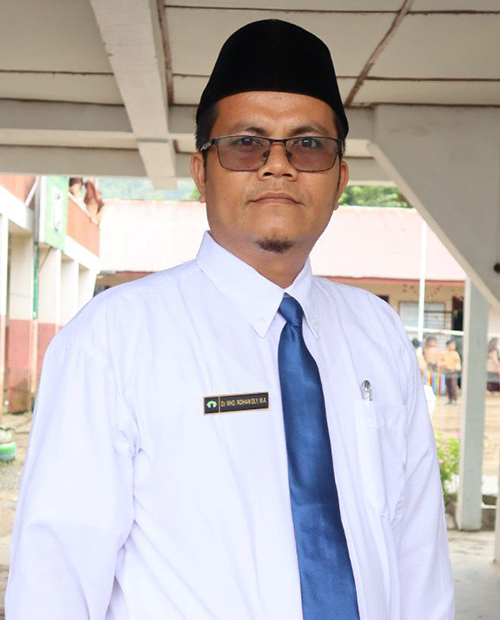Improving Student Learning Outcomes in Mathematics Learning through Role Playing Method at MI Negeri 3 Banjarnegara
DOI:
https://doi.org/10.62945/jcii.v1i1.71Keywords:
Role playing Metohd, Learnign Outcomes, MathematicsAbstract
Implementation of Role Playing Method to Improve Student Learning Outcomes in Mathematics Subjects About Addition Story Problems for Class 2 of State Elementary School 3 Banjarnegara in the 2021-2022 academic year. The purpose of this study is as an effort to improve student learning outcomes that are still far from the learning success rate of at least 80%. In addition, this study was conducted as a Strengthening of Professional Skills as a Teacher. Based on the results achieved in the initial learning, only 63% of students were declared to have passed the learning process, while other students felt bored because the learning process with the lecture method turned out to be very monotonous and did not involve students, making them uninterested in understanding the lesson, which made the grades they achieved below the Minimum Completion Criteria (KKM). In the process of improving learning in the first cycle with the classical demonstration method, there was an increase in success, although the increase was not optimal, reaching 74%, but in the second cycle learning process with the Role Playing method in groups, success increased sharply to 85%. Thus, it can be ascertained that the way to teach students is by involving students directly, namely through the Role Playing method, this makes students motivated to improve their understanding, so that the learning outcomes achieved by students are at a level that meets the KKM.
Downloads
References
Arikunto, S. (2002). Prosedur Penelitian. Bandung: Rineka Cipta.
Dasopang, M. D., Lubis, A. H., & Dasopang, H. R. (2022). How do Millennial Parents Internalize Islamic Values in Their Early Childhood in the Digital Era? AL-ISHLAH: Jurnal Pendidikan, 14(1), 697–708.
Dasopang, M. D., Nasution, I. F. A., & Lubis, A. H. (2023). The Role of Religious and Cultural Education as A Resolution of Radicalism Conflict in Sibolga Community. HTS Theological Studies, 79(1), 1–7.
Erawadi, E., Hamka, H., & Juliana, F. (2017). The Analysis of Student’s Stressed Syllables Mastery at Sixth Semester of TBI in IAIN Padangsidimpuan. English Education: English Journal for Teaching and Learning, 5(1), 44–57.
Fatimah, A., & Maryani, K. (2018). Visual Literasi Media Pembelajaran Buku Cerita Anak. Jurnal Inovasi Teknologi Pendidikan, 5(1), 61–69. https://doi.org/10.21831/jitp.v5i1.16212
Gogahu, D. G. S., & Prasetyo, T. (2020). Pengembangan Media Pembelajaran Berbasis E-Bookstory untuk Meningkatkan Literasi Membaca Siswa Sekolah Dasar. Jurnal Basicedu, 4(4), 1004–1015.
Hamka, H. (2023). The Role of Principals on Teacher Performance Improvement in a Suburban School. QALAMUNA: Jurnal Pendidikan, Sosial, Dan Agama, 15(1), 371–380.
Hamka, H., Suen, M.-W., Anganthi, N. R. N., Haq, A. H. B., & Prasetyo, B. (2023). The Effectiveness of Gratitude Intervention in Reducing Negative Emotions in Sexual Abuse Victims. Psikohumaniora: Jurnal Penelitian Psikologi, 8(2), 227–240.
Harahap, S. M., & Hamka, H. (2023). Investigating the Roles of Philosophy, Culture, Language and Islam in Angkola’s Local Wisdom of ‘Dalihan Na Tolu.’ HTS Teologiese Studies/Theological Studies, 79(1), 8164.
Hendrawati, S., Rosidin, U., & Astiani, S. (2020). Perilaku hidup bersih dan sehat (PHBS) siswa/siswi di sekolah menengah pertama negeri (SMPN). Jurnal Perawat Indonesia, 4(1), 295–307. https://doi.org/https://doi.org/10.32584/jpi.v4i1.454
Lubis, A. H. (2019). Upaya Peningkatan Hasil Belajar Siswa Sekolah Dasar melalui Model Cooperative Learning Tipe Numered Heads Together. FORUM PAEDAGOGIK, 11(2), 127–143.
Lubis, A. H. (2023). The Interactive Multimedia Based on Theo-Centric Approach as Learning Media during the Covid-19 Pandemic. JPI (Jurnal Pendidikan Indonesia), 12(2), 210–222.
Lubis, A. H., & Dasopang, M. D. (2020). Pengembangan Buku Cerita Bergambar Berbasis Augmented Reality untuk Mengakomodasi Generasi Z. Jurnal Pendidikan: Teori, Penelitian, Dan Pengembangan, 5(6), 780–791.
Lubis, A. H., Dasopang, M. D., Ramadhini, F., & Dalimunthe, E. M. (2022). Augmented Reality Pictorial Storybook: How does It Influence on Elementary School Mathematics Anxiety? Premiere Educandum: Jurnal Pendidikan Dasar Dan Pembelajaran, 12(1), 41–53.
Lubis, A. H., & Wangid, M. N. (2019). Augmented Reality-assisted Pictorial Storybook: Media to Enhance Discipline Character of Primary School Students. Mimbar Sekolah Dasar, 6(1), 11–20. https://doi.org/10.17509/mimbar-sd.v6i1.16415
Lubis, A. H., Yusup, F., Dasopang, M. D., & Januariyansah, S. (2021). Effectivity of Interactive Multimedia with Theocentric Approach to the Analytical Thinking Skills of Elementary School Students in Science Learning. Premiere Educandum: Jurnal Pendidikan Dasar Dan Pembelajaran, 11(2), 215–226.
Manshur, U., & Ramdlani, M. (2019). Media audio visual dalam pembelajaran PAI. Al-Murabbi:Jurnal Pendidikan Agama Islam, 5(1), 1–8.
Mardhiyah, R. H., Aldriani, S. N. F., Chitta, F., & Zulfikar, M. R. (2021). Pentingnya Keterampilan Belajar di Abad 21 sebagai Tuntutan dalam Pengembangan Sumber Daya Manusia. Lectura: Jurnal Pendidikan, 12(1), 29–40.
Ningsih, Y. S., Mulia, M., & Lubis, A. H. (2023). Development of Picture Storybooks with TheoAnthropoEco Centric Approach for Elementary School Students. AL-ISHLAH: Jurnal Pendidikan, 15(2), 1888–1903.
Nurhidayah, I., Asifah, L., & Rosidin, U. (2021). Pengetahuan , Sikap dan Perilaku Hidup Bersih dan Sehat pada Siswa Sekolah Dasar. 13(1), 61–71. https://doi.org/10.32528/ijhs.v13i1.4864
Pebtiyanti, I., Ahmad, A., Dzaky, M., Fauziah, S. N., Rendi, & Puspitasari, P. (2023). Peran kurikulum merdeka dalam meningkatkan harmonisasi antara masyarakat dan sekolah. Jurnal Pacu Pendidikan Dasar, 3(1), 269–277. https://doi.org/https://doi.org/10.22021/pacu.v3i1.411
Rahmah, S., & Lubis, A. H. (2024). Problem Posing as a Learning Model to Improve Primary School Students’ Mathematics Learning Outcomes in Gayo Lues. Journal of Indonesian Primary School, 1(4), 93–104.
Rahman, A., Munandar, S. A., Fitriani, A., Karlina, Y., & Yumriani. (2022). Pengertian Pendidikan, Ilmu Pendidikan dan Unsur-Unsur Pendidikan. Al Urwatul Wutsqa: Kajian Pendidikan Islam, 2(1), 1–8.
Ranisa, R., Erawadi, E., & Hamka, H. (2018). Students’ Mastery in Identifying Adverbs at Grade VIII SMPN 2 Batang Toru Tapanuli Selatan. ENGLISH EDUCATION JOURNAL: English Journal for Teaching and Learning, 6(2), 241–252.
Ricardo, R., & Meilani, R. I. (2017). Impak Minat dan Motivasi Belajar terhadap Hasil Belajar Siswa. Jurnal Pendidikan Manajemen Perkantoran (JPManper), 2(2), 188–201.
Santi, Undang, & Kasja. (2023). Peran Guru PAI dalam Membentuk Karakter Peserta Didik di Sekolah. Jurnal Pendidikan Tambusai, 7(2), 16078–16084. https://doi.org/https://doi.org/10.31004/jptam.v7i2.8918
Sugiyono. (2018). Metode Penelitian Kuantitatif Kualitatif dan R&D. Bandung: Alfabeta.
Downloads
Published
Issue
Section
License

This work is licensed under a Creative Commons Attribution-ShareAlike 4.0 International License.










